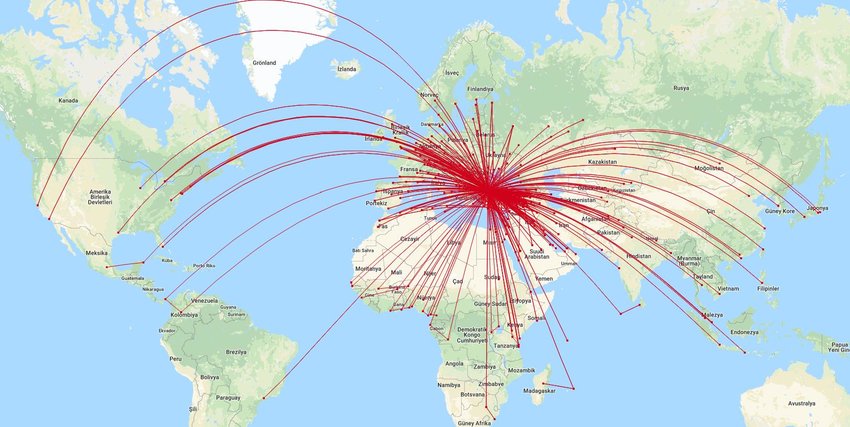By Sophia Lashmar, Year 11
High School students may have noticed that the cafeteria has been unusually quiet and abnormally empty in recent times. The reason for this is the plethora of international trips currently being undertaken by LGB students. This leaves those left behind asking themselves: are these trips worth it and are they truly the best way of helping worthwhile causes?
On the one hand, the trips do provide a number of benefits, not only to the local communities visited, but also to LGB students themselves. It should be noted that while most commonly referred to as trips, in reality these are long-term projects for which motivated students dedicate their precious free time, hard work, and passion. These projects involve and benefit the entire school community through raising awareness about other cultures, provoking discussions around our privilege as international school students and residents of Geneva, and in encouraging students, parents and teachers to support charitable projects.
In terms of benefiting all participating parties, cultural exchange is the most long-lasting advantage of our school’s involvement. These trips and projects are a once-in a lifetime opportunity, both for LGB students to expand their horizons, and for the chance to learn about other cultures, traditions and ways of life. In this sense, these projects represent the very core of Ecolint’s mission to promote global citizenship, culture awareness, and to implement social impact.
Visits to India, Guinea, Cambodia and Zambia are, as mentioned, unique and once-in-a lifetime opportunities much appreciated by students. The experience of actively taking part in service projects to benefit entire communities creates a sense of responsibility and can help students to develop hands-on skills, gain more practical knowledge and develop deeper understandings than in static classroom environments. These projects curate a greater sense of responsibility in students and encourage them to consider how they might help their own communities here in Geneva. The timing of these trips also contribute to their uniqueness, as the projects are based around helping students and children, which provides the opportunity for a richer experience while we ourselves can empathise and form more meaningful connections as teenagers communicating with our peers.
As international school students, we can end up indulging ourselves in a bubble of privilege and disconnect from our local community in Geneva; and by living abroad from our home countries, we are in many ways cut off from our own cultures. As part of these projects, our students are able to appreciate the vibrance of other cultures, traditions, ways of life and environments, forming deeper connections with each other through shared understanding of isolation, and in learning the value that shared culture can pose to struggling communities. It should not go unsaid that LGB students do undergo a significant learning curve on these trips, as they begin to realise their own privilege and opportunities.
The change of environment also adds significant value to the learning experience of these trips. While La Grande Boissière is surrounded by a beautiful forest and carefully curated plants and delightful displays of nature, we are after all a city campus. Conveniently placed on a tramline, surrounded by apartment blocks, shops and restaurants, we are not exactly interacting with nature in our everyday lives. Travelling through remote landscapes, students (and teachers) are able to appreciate the natural beauty of the places they are visiting and take the time to learn about the local environments and be made aware of the devastatingly harmful impact of climate change on these local communities.
In terms of funding and the financial benefit these trips bring to local communities, money is raised by participating students in a variety of ways, ranging from bake sales, talent shows, dances and events; it is then used to fund new infrastructure, schools, building repairs following damage due to natural disasters, essential school supplies, books, toys, games and funds for food and healthcare. The investment made in the community with the money raised is desperately needed and highly appreciated. Not only do these projects seek to fund the purchasing of essential physical commodities, but they also endeavour to make an impact on the education of the local children, providing help in lessons while they are there, as well as longer-term support from Geneva.
However, it should be acknowledged that despite the overwhelming arguments in their favour, there are certainly downsides to these trips. When it comes to describing these valuable projects, there is a danger in using the terms ‘visiting’ and ‘trip’, as they create the misconception that these are ‘holidays’ and merely beneficial to our own students. This issue is exacerbated by the shortness of the trips, and the limited periods of actual practical involvement and participation. For this reason, the projects place emphasis on long-term investment into sustainable solutions in these communities, instead of short-term, temporary aid.
Lastly, while such trips are important, the ones offered by our school are to far-flung locations and do require significant financial commitment. It has been raised that trips to equally deserving communities that are closer to home may be of more value, as less money would be spent on travel, and more on helping the people in question. However, this would not expose our students to as many opportunities for cultural enrichment, and furthermore the trips focus on areas where our school has prior connections and is able to make the most significant impact.
Many also question the costs of these trips in order for the students to participate. Often asked is “Would it not be better to donate the money otherwise spent on travel directly to the cause, or even just run fundraising projects instead of trips?”. If this is a question you still find yourself asking, then you have missed the premise of these endeavours: forging meaningful connections, sustainably investing in the future of struggling local communities and promoting cultural exchange.
These trips and projects embody the ‘Spirit of Ecolint’ and encourage students to use their skills, resources and privilege to help others as much as possible.



